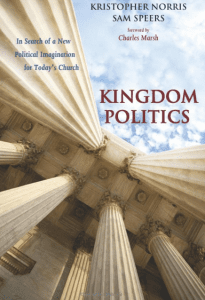 You don’t have to Google for long to find someone who is tired of how political the church can be. One of the most common complaints by the new generation of Christians points at the politicization of the church, though at times what they mean is the politics are not theirs and if it was theirs they wouldn’t complain and would in fact see it as gospel work! But that reverse criticism describes only some of the church’s critics.
You don’t have to Google for long to find someone who is tired of how political the church can be. One of the most common complaints by the new generation of Christians points at the politicization of the church, though at times what they mean is the politics are not theirs and if it was theirs they wouldn’t complain and would in fact see it as gospel work! But that reverse criticism describes only some of the church’s critics.
The problem is not the politicization of the church; the problem is the kind of politics too many churches engage.
What is clear to many today is that the church needs to embrace a new way of doing kingdom politics, and inherent to that is — if I may use a very ugly word — for it to become de-partisanized in its political postures. It needs then to be re-partisanized to the King and his kingdom in its political postures.
I see such an appeal in the new and very helpful book by Kristopher Norris and Sam Speers, Kingdom Politics: In Search of a New Political Imagination for Today’s Church. I’m biased for these authors for not only did they study at Virginia with scholars like Charles Marsh and James Davison Hunter, but they are conversant with a variety of what this looks like on the ground among anabaptist types. They like Bonhoeffer, Hauerwas, Hunter, ML King Jr, Jamie Smith and Yoder. My kind of interaction.
The core of this book is to examine the “political practices” of representative churches — Saddleback, Solomon’s Porch, First and Franklin Presbyterian, Prairie Street Mennonite, and Ebenezer Baptist. That span of churches ought at least to draw you into their discussion. It did me, as this is a fine example of what Charles Marsh is developing at Virginia under the category of “lived theology.”
Surrounding this is theory and theology and conclusions. They face the problem head on for churches form into “partisan” theories about the very mission of the church: spiritual vs. social. Thus,
And yet, we realized, nearly all of their answers have something in common: they have separated the pursuit of spiritual formation from the work of social transformation, and therefore struggle to produce disciples who grow in love for both God and neighbor. For some churches the focus is primarily on the individual, on evangelism and developing members’ “personal faith,” while other churches focus on public issues of social justice and government policy (3).
Observers label these often-competing agendas in several ways: priestly and prophetic, faith and action, conversionist and activist, personal piety and social change, worship and missions. Our favorite way to frame this is that many churches worship Jesus the King, but avoid the messiness of working for his kingdom (3). [I’ll drop my response to the use of the word “kingdom” here.]
Norris and Speers think the two are inseparable: you can’t have the King without social transformation. They are calling for a kingdom politics and know that the current alignment is deeply entrenched, broken, and in need of change:
Churches on both the Left and the Right have accepted a vision of politics based on the strategy of the religious right, which they either mimic by centering their public mission on policy advocacy, or react against by washing their hands of politics altogether. … Our primary claim in this book is that the church needs a new political vision, one that takes its cues about the nature of politics from another political reality: the kingdom of God (7).
The church, they contend, is a politics, a kingdom politics.
We propose that a deeper recognition of the church as a political body will help churches to integrate these two functions of their mission, and to recognize that even piety is political.19 We believe that churches need to broaden their political imagination, to understand that 1) the church is an inherently political community, and i) ordinary church practices are politically significant. This more biblical understanding of the church will help churches to reintegrate King and kingdom by designing practices that more faithfully cultivate holistic followers of Christ—disciples fully devoted to Jesus as Savior and Lord, and committed to continuing Jesus’ work to transform the world (9).
Only when the church understands itself as a politics does it know when and how to enter into the public sector. It can restrict improper partisanship and encourage political action by a kingdom vision.
Only when the church understands itself as a politics does it know with whom to partner in kingdom politics.
Only when the church understands itself as a politics does it know which practices to engage in for the purpose of formation and transformation.











